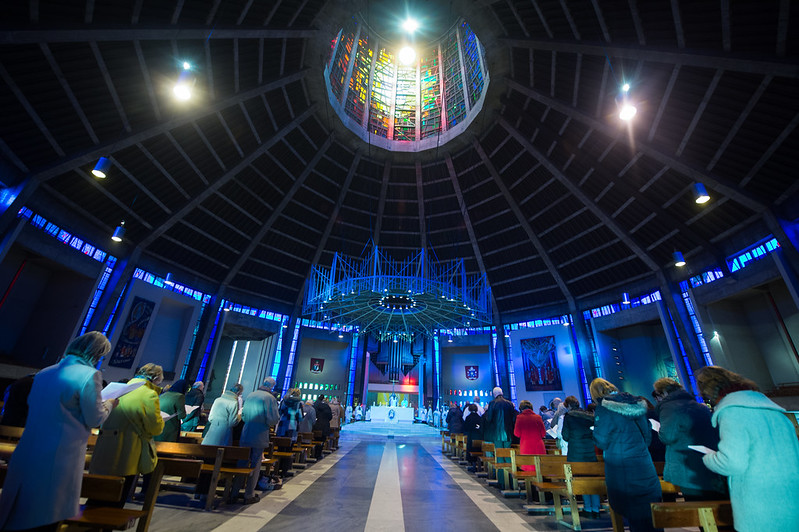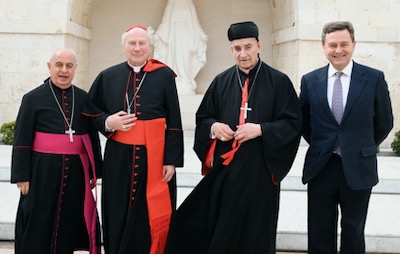Cardinal Béchara Rai, Patriarch of Antioch and head of the Maronite Church, made his plea following a visit to Lebanon by Guterres in December when the secretary general met religious leaders. In his memorandum he warns that a combination of poverty, unemployment, emigration of the professional classes, two million refugees from Palestine and Syria, together with corruption of the governing classes is providing a toxic cocktail, threatening to undermine the nation.
Lebanon, wrote Cardinal Rai, “is a meeting place for all religions, and more specifically Christianity and Islam”, but now Lebanon “is sick, and it seeks healing”.
The dire problems that Lebanon faces were outlined by leaders of the major Catholic Churches to a delegation of the Catholic charity Fellowship and Aid to the Christians of the East (Face) when it visited earlier this month. The chairman, John Adam Fox and its patron, Cardinal Michael Fitzgerald, were told that the country’s situation was unsustainable, with currency devaluation increasing the price of fuel and food by 2,000 per cent, and two million Syrian and Palestinian refugees making up more than a third of the population of the country. “It’s a heavy burden on Lebanese society and its economy,” said Fox. “The problem of their care and resettlement should be shared by other states, including those in the West”.
Fox and Cardinal Fitzgerald met all four Catholic patriarchs who reside in Beirut during their visit; as well as Rai, whose Maronites make up a quarter of the Lebanese population, they met the Syriac Catholic Church’s Patriarch Ignatius Younan, the Greek Melkite Catholic Church’s Beatitude Youssef Absi and Beatitude Raphael Bedros Minassian, Catholic-Patriarch of Cilicia of the Armenians. They also met 30 Maronite bishops from across the Middle East, Apostolic Nuncio to Lebanon Archbishop Joseph Spiteri and representatives of Catholic aid organisations, hospitals and schools.
Among the problems highlighted by Archbishop Spiteri and the church leaders during the Face visit are that 330 Catholic schools in Lebanon are entitled to government subsidies but have received nothing for the past five years and that the 20 Christian hospitals in Lebanon are struggling because of crippling inflation pushing up the cost of fuel, salaries and medicines.
A further problem is the brain drain of professionals from Lebanon that is having a dire effect on Lebanon’s ability to function as doctors, nurses, teachers, engineers and others leave the country, even though they send funds home. The majority of those leaving are Lebanese Christians, thus hastening the decline of Christianity in the Middle East.
Cardinal Michael Fitzgerald warned that the exodus of Lebanese Christians is particularly worrying.
“The brain-drain from Lebanon, especially of Christians, is certainly very a great worry, since it puts in danger many of the Institutions of Lebanon, schools, hospitals, universities, to which Christians have been contributing way beyond the numbers that they make up in the population,” he said. “Of course it is also of great concern that the number of Christians is diminishing in Lebanon and elsewhere in the Middle East. It is always hoped that Lebanese Christians will return to their country, but few seem to be doing this.”
During the visit, the nuncio, Archbishop Spiteri highlighted how some Gulf States, Australia and Canada are contributing to the brain drain by freely issuing visas to Lebanese teachers, doctors and nurses.
The Face delegation saw for themselves the impact of migration on the Hospital of the Rosary in Gemmayze near Beirut’s port which has lost half of its nurses to migration and at the Sacred Heart Hospital in Baabda, which once provided healthcare to more than 11,000 Lebanese. “It needs help to top up medical salaries which as a result of galloping inflation have become worthless,” said Fox. “The hospital has lost 20 per cent of its nurses and 15 per cent of its doctors to migration and half of the beds are closed.”
Cardinal Rai’s call for a UN summit on Lebanon has been supported by the Vatican, including Secretary of State Pietro Parolin, and is likely to be recommended at the UN in New York by Archbishop Gabriele Giordano Caccia, the Holy See’s Permanent Observer there.
The delegation from Face, which works to help Christians stay in their homes in the biblical lands, also met organisations involved in interfaith dialogue, bringing Christians and Muslims together, and found signs of hope in their conversations.
“The present situation in Lebanon underlines the need to think of the common good rather than of the good of one's own group,” said Cardinal Fitzgerald. “There is a need to implement the Human Fraternity Document that Pope Francis co-signed with the Grand Imam of al-Azhar. This would be a form of dialogue of action. Some of the younger people we met would seem to ready to go in this direction. It was pointed out to us that, after the port explosion, they came together immediately to clean up the mess.”
Face works in partnership with its sister agency L’Oeuvre d’Orient in collaborating with diocesan bishops and religious communities of the Eastern Catholic Churches.



 Loading ...
Loading ...